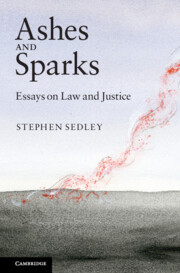Book contents
- Frontmatter
- Contents
- Preface
- Acknowledgements
- PART I History
- PART II Law
- PART III Justice
- 24 The right to know
- 25 The moral economy of judicial review
- 26 Policy and law
- 27 Responsibility and the law
- 28 The Crown in its own courts
- 29 Human rights – who needs them?
- 30 Fundamental values – but which?
- 31 Overcoming pragmatism
- 32 Sex, libels and video-surveillance
- 33 This beats me
- 34 Public inquiries: a cure or a disease?
- 35 Human rights: a twenty-first century agenda
- 36 Are human rights universal, and does it matter?
- 37 Bringing rights home: time to start a family?
- 38 The four wise monkeys visit the marketplace of ideas
- Index
32 - Sex, libels and video-surveillance
Published online by Cambridge University Press: 05 June 2012
- Frontmatter
- Contents
- Preface
- Acknowledgements
- PART I History
- PART II Law
- PART III Justice
- 24 The right to know
- 25 The moral economy of judicial review
- 26 Policy and law
- 27 Responsibility and the law
- 28 The Crown in its own courts
- 29 Human rights – who needs them?
- 30 Fundamental values – but which?
- 31 Overcoming pragmatism
- 32 Sex, libels and video-surveillance
- 33 This beats me
- 34 Public inquiries: a cure or a disease?
- 35 Human rights: a twenty-first century agenda
- 36 Are human rights universal, and does it matter?
- 37 Bringing rights home: time to start a family?
- 38 The four wise monkeys visit the marketplace of ideas
- Index
Summary
This was the Blackstone Lecture delivered in Oxford in 2006 and subsequently published in the London Review of Books. It argues, among other things, that libel law has got into an impossible tangle in trying to protect both free speech and reputation, but that if the media are to be relieved of the expense and uncertainty of litigation they may have to accept regulation in its place.
The paper also looks at our progress towards a right of privacy – an opportunity which was lamentably turned down by the common law but then taken by the law of human rights.
There are some who will have taken a sadistic pleasure in the failure of the recent attempt by the News of the World's undercover reporter Mazher Mahmood, the ‘fake sheikh’, to prevent George Galloway from publishing photographs of him on the internet. But those who are keen to see privacy protected by law were making a mistake if they cheered or jeered at the court's refusal to protect Mahmood from the kind of exposure to which his paper regularly subjects others. The real coup would have been if the court had accepted his counsel's argument that the unwanted publicity violated Mahmood's right to respect for his private life and Mahmood v. Galloway had become authority for a freestanding right of privacy.
The protection of privacy was largely left by the common law to the law of trespass.
- Type
- Chapter
- Information
- Ashes and SparksEssays On Law and Justice, pp. 311 - 324Publisher: Cambridge University PressPrint publication year: 2011



